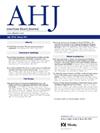美国成年人中与癌症和心力衰竭相关的死亡率趋势:疾病预防控制中心 WONDER 数据库对 1999 年至 2020 年的分析。
IF 3.7
2区 医学
Q1 CARDIAC & CARDIOVASCULAR SYSTEMS
引用次数: 0
摘要
背景:随着新型化疗的出现,癌症患者的生存率有所提高。然而,癌症患者患心力衰竭(HF)的风险也在增加。相反,与心力衰竭相关的死亡率可能会影响癌症患者的生存。我们旨在分析美国成年人口中心力衰竭和癌症患者的死亡率趋势:我们对来自美国疾病控制与预防中心 WONDER(美国疾病控制与预防中心流行病学研究广泛在线数据)数据库的 1999 年至 2020 年死亡证明书进行了研究。对患有高血压和癌症的成人死亡率进行了评估。报告了每 10 万人的年龄调整死亡率(AAMRs)和每年的百分比变化:结果:1999 年至 2020 年间,621,783 例癌症患者死于高血压。AAMR从1999年的16.4下降到2017年的11.9,之后在2020年又上升到14.5。与女性相比,男性的总体急性心肌梗死死亡率一直较高(男性 = 18.1 vs 女性 = 9.9)。非西班牙裔(NH)黑人/非洲裔美国人(13.9)和 NH 白人(13.3)之间的 AAMR 相似,而美国印第安人/阿拉斯加原住民(9.6)和西班牙裔美国人(7.4)较低。亚裔/太平洋岛民的 AAMR 最低(5.7)。中西部地区报告的 AAMR 最高(14.8)。我们观察到老年人口的 AAMR 最高(61.4):结论:在美国成年人口中,高血压和癌症患者的死亡率正在上升:结论:在美国成年人群中,心房颤动合并癌症患者的死亡率正在上升:这强调了对癌症患者中的高危人群或有心房颤动表现的人群加强筛查、积极管理和后续监测的必要性。本文章由计算机程序翻译,如有差异,请以英文原文为准。

Trends in cancer and heart failure related mortality in adult US population: A CDC WONDER database analysis from 1999 to 2020
Background
With the advent of novel chemotherapy, survival of patients with cancer has improved. However, people with cancer have an increased risk of heart failure (HF). Conversely, HF-related mortality may undermine survival among people with cancer. We aim to analyze the trends of mortality in people with HF and cancer in the adult US population.
Methods
We conducted an examination of death certificates sourced from the CDC WONDER (Centers for Disease Control and Prevention Wide-Ranging Online Data for Epidemiologic Research) database, from the years 1999 to 2020. Mortality in adults with HF and cancer was assessed. Age-adjusted mortality rates (AAMRs) per 100,000 persons and annual percent change were reported.
Results
Between 1999 and 2020, 621,783 deaths occurred from HF in people with cancer. The AAMR declined from 16.4 in 1999 to 11.9 in 2017, after which an increase to 14.5 was observed in 2020. Men had consistently higher overall AAMR as compared to women (men = 18.1 vs women = 9.9). Similar AAMR was observed between non-Hispanic (NH) Blacks/African Americans (13.9) and NH Whites (13.3), with lower in American Indian/Alaska Native (9.6) and Hispanics (7.4). Asian/Pacific Islanders reported the lowest AAMR (5.7). The Midwestern region reported the highest AAMR (14.8). We observed the highest AAMR amongst the older population (61.4).
Conclusion
The mortality rates of people with HF and cancer are increasing in the adult U.S. population. This underscores the need for increased screening, aggressive management, and subsequent surveillance of people at risk or with manifested HF in people with cancer.
求助全文
通过发布文献求助,成功后即可免费获取论文全文。
去求助
来源期刊

American heart journal
医学-心血管系统
CiteScore
8.20
自引率
2.10%
发文量
214
审稿时长
38 days
期刊介绍:
The American Heart Journal will consider for publication suitable articles on topics pertaining to the broad discipline of cardiovascular disease. Our goal is to provide the reader primary investigation, scholarly review, and opinion concerning the practice of cardiovascular medicine. We especially encourage submission of 3 types of reports that are not frequently seen in cardiovascular journals: negative clinical studies, reports on study designs, and studies involving the organization of medical care. The Journal does not accept individual case reports or original articles involving bench laboratory or animal research.
 求助内容:
求助内容: 应助结果提醒方式:
应助结果提醒方式:


